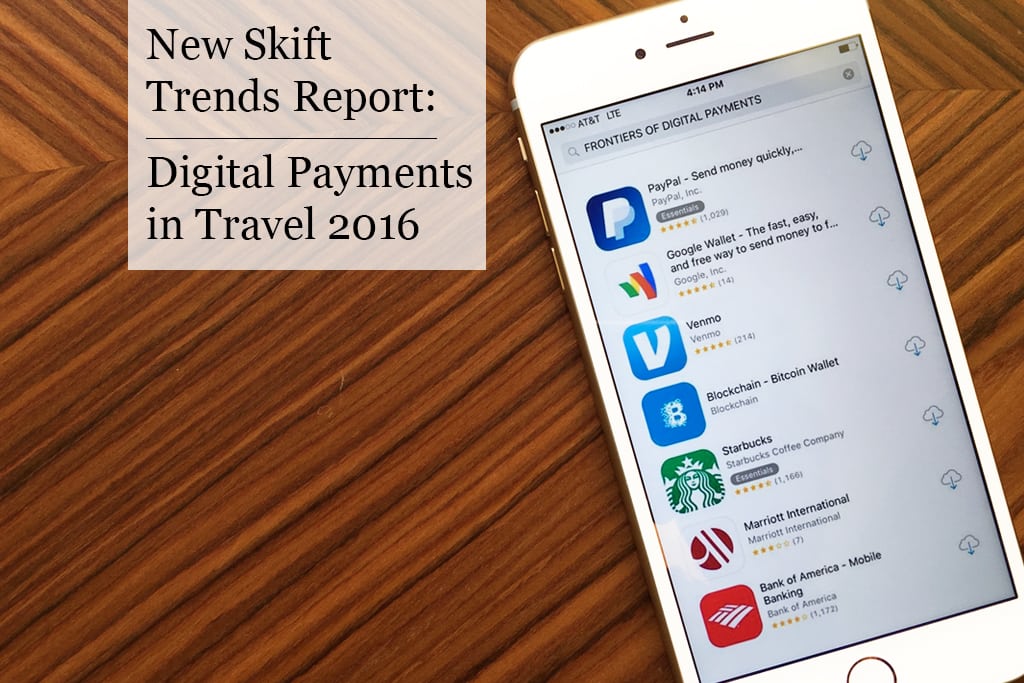Skift Take
The global digital payments ecosystem is undergoing a rapid and monumental shift; smart travel brands need to stay on top of the shifts in how we pay for goods and services.
Today we are launching the latest report in our Skift Trends Reports service, Digital Payments in Travel 2016.
Imagine this scenario:
You book your flight and hotel using Apple Pay (or Samsung Pay); jump into your neighborhood Uber (or Lyft) and head straight to the airport but not before paying with your digital wallet; landing in Dubai you transfer local credits to your account through a bitcoin enabled transfer platform that eliminates any transaction or currency exchange fees that you may have paid in the past; upon landing, you connect directly to Dubai’s city-wide loyalty platform, powered by blockchain technology, and now you’re connected, enjoying preferential discounts via loyalty points that you had earned back home and now use to redeem deals from local partner networks. A handful of business meetings, dinners, lunches, and coffee shop meetings later – all paid for and split among colleagues fair and square with a swipe of your phone – and you’re heading home without ever having pulled your credit or debit card out of your wallet.
This is the new reality that travel brands now need to work with. The global digital payments ecosystem is undergoing a rapid and monumental shift; smart travel brands should stay on top of the shifts in how we pay for goods and services. Peer-to-peer payment platforms, digital wallets, and cryptocurrencies may have been a thing of science fiction just years ago. Yet, many of the data points now clearly suggest otherwise.
Venmo processed more than $1 billion just in the month of January 2016; usage continues to explode. Apple Pay launched in October of 2014 amid skepticism, yet now touts over two million point of sale locations in the U.S. and growing fast. Australia, Canada, the UK, and China have all joined the list of countries where Apple Pay is now live. Airbnb, Delta, Expedia, Hotel Tonight, Lyft, Priceline, and Uber all now accept Apple Pay. Over 141 million transactions have been processed with Bitcoin since the decentralized currency launched in 2009.
Traditional credit and debit card transactions still dominate the payment method landscape, but for how long? Banks are worried about Apple Pay, and for good reason. Bigger retailers have it easier with digital payments but all of that is changing thanks to a few good startups.
Preview and Buy the Full Report
Subscribe to Skift Trends Reports
This is the latest in a series of twice-monthly reports aimed at analyzing the fault lines of disruption in travel. These reports are intended for the busy travel industry decision maker. Tap into the opinions and insights of our seasoned network of staffers and contributors. Over 100 hours of desk research, data collection, and/or analysis goes into each report.
After you subscribe, you will gain access to our entire vault of reports conducted on topics ranging from technology to marketing strategy to deep-dives on key travel brands. Reports are available online in a responsive design format, or you can also buy each report a la carte at a higher price.
Get Skift Research
Skift Research products provide deep analysis, data, and expert research on the companies and trends that are shaping the future of travel.
Have a confidential tip for Skift? Get in touch
Tags: mobile, mobile payments, payments, research reports
